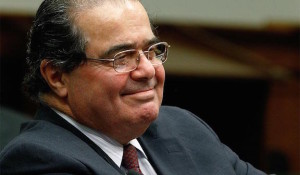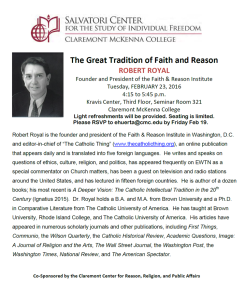It began, for me, with a voice over the phone in May 1977: “Hadley, this is Nino Scalia.” I’d never met him, but in the most generous way he was coming to do a commentary on the paper I was offering at the end of my year as a Fellow at the Woodrow Wilson Center of the Smithsonian.
He had been in the prestigious Office of Legal Counsel at the Department of Justice in the Ford Administration. But with the election of Jimmy Carter, Nino had found refuge at the American Enterprise Institute before returning to his real vocation as a teacher, this time at the law school of the University of Chicago.
Twenty-one years later he would write me to say that the youngest of the nine Scalia children, daughter Margaret (or Meg) was interested in Amherst College. “And I figure,” he said, “that if the place has tolerated you for thirty years now, it can’t be all that bad.” Yes, it could be, but Meg flourished there.
And I myself became more absorbed in this loving, rolling feast of a family as the years went on. But then, the shock of his death came with a force that could tilt the earth on its axis. The first response was disbelief and denial – that someone so life-giving, and so vital to the country right now, should be ripped away from us.
Friends will be asked in the days ahead to give accounts, or offer statements on his legacy, and it will be so hard to sift through the memories and notes – through the rollicking nights at supper, with jokes and song; through the recall of the oral arguments, made sharper – and funnier – by his interventions; and then to the force of his dissents in both dimensions: written and oral.
The writing was pointed, piercing, going to the logical core, but gaining in rhetorical force as moved to its end. But then also in delivery: he was often angry and incredulous at the outcome, but the dissent was read with an anger subdued, read with a calm voice, perhaps the voice of a father seeking, with some disappointment and regret, to explain to the family gathered around that something had gone wrong.
“I read that dissent,” he told me one day, “because there were reporters there, and wouldn’t you think they would be interested in the First Amendment?” His colleagues had just sustained a law in Colorado aimed so evidently at one class of demonstrators – pro-lifers outside an abortion clinic –and requiring them to stay more than eight feet away from people entering the clinic. That was Hill v. Colorado, in June 2000.
Nino let Clarence Thomas take over reading the dissent in Stenberg v. Carhart, as their colleagues were willing to strike down a law in Nebraska that barred the grisly procedure known as “partial-birth abortion.” Nino hoped that the sympathies of the media might be recruited to support the “freedom of speech” even of people they found uncongenial. But the sober lesson breaking through was that the pro-lifers alone would be left out of the protections of speech that Nino had been seeking to expand.
* * * * *
Scalia has been identified with “Originalism” in the reading of the Constitution. Originalists want to be governed by the words in the text of the Constitution and how they were understood by the framers who put them there.
To appeal outside the text marked the courting of danger; for to speak of deeper principles underlying the text – principles that would be there even if the text weren’t there – well, that was to whisper the logic of (gasp!) “natural law.”
But Scalia was a relentless logician, and as he sought the logic behind the text he would persistently find himself reasoning back to those principles that were not in the text. I used to tell him that he persistently scoffed at natural law, and yet he persistently offered handsome examples of how a jurisprudence of natural law would be done.
He and I would banter in a good-natured way about these things, but no one spoke my own mind more often, or more surely, than he did, on case after case coming out of the Court. Whether it was his resistance to a constitutional right to abortion or same-sex marriage or racial preferences, he spoke sharply, going to the core of things.
When my wife, Judy, had died suddenly a little over a year ago, Nino and Maureen joined me and my family in a Memorial Mass. I was in the first row of this small chapel and there was no kneeler there. As I knelt, I felt the pain of the floor. But just behind me Nino noticed. And he slipped a cushion under my knees. In a note just after he died, my friend David Forte recalled that moment, which he himself had noticed.
Nino, he said, had been my protector at that moment, as he had been in his own way the protector of us all. And so many had barely noticed. No one can take his place in our hearts, and to ask, “Who would take his place on the Court” is to ask: who is there, by character and wit, who is worthy enough to take up his mission?
Click to expand

















